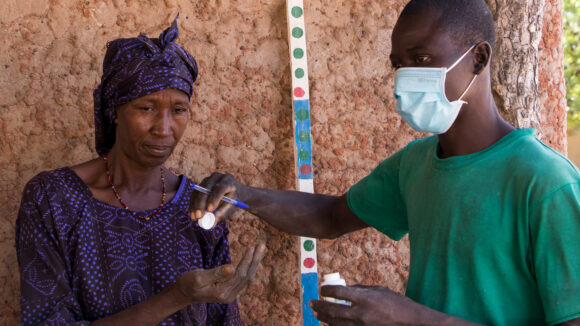River blindness, officially called ‘onchocerciasis’, is a parasitic infection spread by black flies. It causes skin irritation and itching, and it can lead to permanent blindness.
River blindness: causes, symptoms and treatment
What is river blindness?
River blindness, also called ‘onchocerciasis’, is a neglected tropical disease caused by a bite from an infected black fly. These flies breed near fast-flowing rivers.
Lady Jean Wilson, Sightsavers’ co-founder and the wife of Sir John Wilson, coined the term river blindness, which is now widely used. People also refer to the disease as ‘oncho’.
River blindness is the world’s second-most common infectious cause of blindness. As it can cause sight loss, people with the disease can experience stigma and discrimination about their disability.
What causes river blindness?
When a person is bitten by an infected black fly, worm larvae invade their body and grow into worms that can live for up to 15 years. Every day, female worms produce thousands of microscopic larvae, which spread throughout the body. If the larvae travel to the person’s eyes, it can cause permanent sight loss.
What are the symptoms of river blindness?
River blindness symptoms include:
- Rashes and nodules beneath the skin
- Inflammation and itching
- Changes to skin colour and texture
- Permanent vision loss
Short-term symptoms of river blindness include loss of vision, which can be reversed if the infection is treated early. If the microscopic larvae have been in the eyes for some time, the sight loss will be permanent but it won’t get worse if the person receives treatment.
When the microscopic larvae die in a person’s body, this can trigger a reaction that leads to immense discomfort. Larvae that die within the eyes can damage the cornea or inflame the optic nerve, leading to sight loss and blindness.

Eliminating river blindness in Mali
Since 1991, Sightsavers been helping Mali’s ministry of health to treat and prevent the disease. Now the country is on track to banish it for good.
Read the storyHow we’re fighting river blindness
Our aim is to eliminate river blindness in the countries where we work.
Most of our campaigns to protect people from river blindness take place in West Africa, where it’s most prevalent. We distribute medicine to treat and prevent the condition alongside another disease called lymphatic filariasis.
These two neglected tropical diseases often spread in the same areas and are treatable by giving large numbers of people medication. This is called mass drug administration.
In 2023, we helped to train more than 120,000 volunteers to administer medicine within their communities. With your support, we can reach even more people and protect them from river blindness so they don’t needlessly lose their sight.
Page last reviewed: April 2024
Next review due: April 2027
Learn how we produce our web content
Find out about other diseases we treat
Neglected tropical diseasesMore about river blindness

Sightsavers researcher awarded prestigious fellowship
The Injaz fellowship will support Martins Imhansoloeva's research and PhD project on river blindness, a common infectious cause of sight loss.

How cultural awareness can help fight NTDs
Sightsavers’ Khadijah Bello travelled across north-central Nigeria to see how our programmes are fast-tracking the elimination of neglected tropical diseases.

Expanding the Reaching the Last Mile Fund: a game-changer for river blindness and lymphatic filariasis
The funding pledge is a huge step towards eliminating the diseases.
Inspirational stories direct to your inbox

Inspirational stories direct to your inbox
Want to hear more from Sightsavers? Join more than 170,000 supporters who receive inspiring emails about life-changing projects and ways to support our work.
You will receive regular updates about our work and can unsubscribe at any time by clicking the link in each newsletter, or by emailing info@sightsavers.org
For more information see our privacy policy
